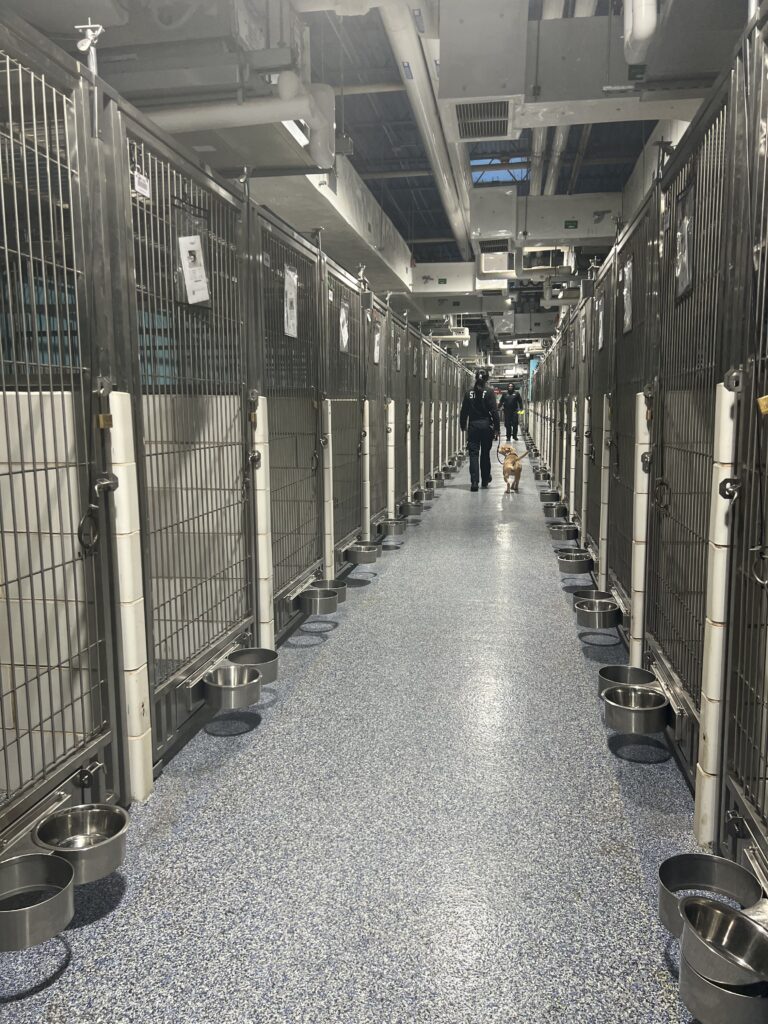
In a recent conversation, a spokesperson for the Charlotte-Mecklenburg Animal Control (ACC) reported having “more open kennels right now than we have had in a long time.” As of February 3, 2025, there were a total of 197 dogs at the ACC’s Toomey Avenue location, and 208 dogs in foster care with community volunteers – and thirteen open kennels. Melissa Knicely, the Communications and Community Outreach Manager for the ACC, provided insight into how the recently completed renovations to the ACC’s shelter has helped facilitate that outcome.
Although many Charlotteans assumed the renovations at the ACC would result in additional kennels, the true focus of this round of renovations, completed in May 2024, was to find solutions for a multitude of smaller problems within the existing space. Before the renovations, all amenities in the facility were over 30 years old, and after the rush of incoming animals following the pandemic, many physical issues that had previously gone overlooked quickly rose to the top of their “laundry list” of concerns. This left them desperately in need for more treatment rooms, isolation rooms, new ventilation systems, new cages, and more. Prior to the renovations, Knicely remembers small dogs squeezing through gaps at the bottom of their kennel doors to escape. Additionally, the spread of disease was difficult to prevent due to the layout of the cat cages and kennel sections, which separate lost dogs, sick dogs, and dogs up for adoption. Knicely says that the “stray cat room used to be a room with about 80 cages, so if one got sick with something very contagious, they were all exposed.” Fortunately, most needs were met through the recent renovations. The ACC was able to remedy their previously inefficient layout, reconstruct their lobby, and put in new kennel doors, locks, floors, and ventilation systems, finally bringing the shelter up to modern standards.
While there are currently more dogs in foster care than in the shelter, this lucky turn of events is not guaranteed to last. Due to the unpredictability of the needs of animals in the Charlotte-Mecklenburg community, one can never be sure how long the spots in the ACC’s kennels will stay open. The shelter’s capacity frequently fluctuates, meaning there’s no telling when it might be overflowing with animals again. Still, the ACC faces pressure from locals to ‘do better.’ Knicely elaborates on this, saying, “If one of our officers goes out tonight and somebody calls in like, ‘Hey, this person lives behind me and we’re concerned because they have a lot of animals and we don’t know if they’re in good conditions,’ and the officer goes out and determines that there’s cruelty going on, and we seize 20 animals…All of a sudden having space to having no space happens just like that. So, it’s very fluid. That’s why it’s hard for us. People are like, ‘you need to do more marketing, or you need to do this, or that’…but it can change on a dime in an instant for us.”
The ACC plans to meet this unpredictability by continuing to expand its facilities in a new location. “We are not making any changes to this facility, however a new adoption center is in the works. So we would have two shelters.” Knicely explained that the current shelter would remain a medical facility that holds lost animals, and the new shelter, which would be located near the intersection of Tyvola and South Tryon Street, would become a new adoption center. “If everything is approved and it moves forward, we would be able to open late in 2027,” she said.
As the ACC prepares for their new building, they are seeking support from the surrounding community. “We always are in need of volunteers, donations, fostering, adoption and overall help advocating for the shelter,” Knicely said. “Everyone working together is what makes Charlotte a better city for animals.” Students of the age of 16 and above can apply to volunteer at the Toomey Avenue location. For more information on how to help, students can visit the ACC’s website at www.charlottenc.gov, and can contact the ACC Call Center via phone at (704) 336-7600.
